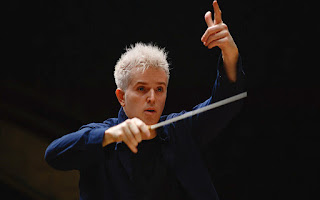 |
| Photo: Miri Shamir |
 |
| Alexander Korsantia (Courtesy A. Korsantia) |
Over recent years, there has been much
discussion about the programming of symphony concerts and whether we hear too
much frequently-performed repertoire without
moving outside of the box to hear lesser known- or new works. The audience
packing the hall of the Tel Aviv Performing Arts Centre to capacity on August
14th 2022 to attend "Beethoven/Chopin", the Israel Symphony Orchestra
Rishon LeZion's final concert for the 2021-2022 season, was proof that the
undisputed masterpieces of the Classical and Romantic eras still remain fresh
and exciting to the public. Conducted by Dan Ettinger, the orchestra's musical
director, and featuring pianist Alexander Korsantia (Georgia), this event was
to have taken place in January 2022, but ended up being postponed due to a rising
wave of the coronavirus.
The concert opened with
Frédéric Chopin's Concerto No.2 in F minor Op.21 for piano and orchestra.
Actually, the first concerto the composer penned, it was written by the
19-year-old Chopin on his return home to Warsaw from a successful impromptu
solo debut in Vienna and completed in the autumn of 1829. From the first
moments of the opening movement (Maestoso), the audience is swept up by
Korsantia's natural manoeuvring of the movement's exquisite poetic elements,
contrasted by moments of dramatic urgency, as the pianist allows the ebb and
flow of Chopin's narrative and melodic inventiveness to dictate his personal
shaping and nuancing of the music. As to the Larghetto (a forerunner of the
nocturnes Chopin would later compose) Korsantia's masterful weaving of its
dreamy, embellished, noble phrases was offset by delicate, attentive playing on
the part of the orchestra, the movement's contrasting middle section beginning
dramatically, with the piano's agitated "comments" placed above
tremolo string textures. Korsantia's handling of the final movement's virtuosic
passagework served as a means rather than an end, delighting the listener with
the freshness and joy of Chopin's mazurka theme, a horn solo introducing the
brilliant F major coda. In streamlined teamwork, Ettinger and Korsantia
presented the magic of Chopin's lyricism and cantabile melodiousness, his lustrous
sonorities and Romantic, pianistic expressiveness. For an encore, the pianist's
wistful, relaxed and beautifully measured reading of a Rag by American
pianist/composer William Bolcom (b.1938) invited the piece to speak for itself.
No new face to Israeli audiences, Alexander Korsantia today resides in Boston,
where he is a Professor of Piano on the faculty of the New England Conservatory.
For the performance of
Ludwig van Beethoven's mammoth Symphony No.3 in E flat major Op.55
"Eroica", Dan Ettinger needed no podium, no baton and no score. We
were in for a performance that would have the audience perched at the edge of
its seats. From the two defiant opening chords of the first movement, the
Rishon LeZion Orchestra punctuated the excitement of the Allegro con brio's
shattering dissonances and rhythmic dislocations with luxuriant, soaring,
cantabile utterances. Then to Ettinger's solemn and moving recreation of the
Marcia funebre, its major middle section and intense fugal section moving back
to the funeral subject, now with added poignancy, grief and anger, the coda's
reticent, downy final statement of the main theme suggesting resignation, then
to build up to an intense climax. With a solo oboe introducing a rustic melody,
we are transported to the lightweight, tripping Scherzo, a piece then
displaying a gigantic
expressive
range and challenging horn writing, the sotto voce sections often underscoring
no less tension than the movement's heroic utterances. In the Finale, Ettinger
and his players entertain the audience with the Allegro molto's pot-pourri - one
comprising the suspenseful, the unpredictable and the hearty, all emanating from
the rich inventiveness of Beethoven’s imagination - as the bass line develops
into a series of variations that climaxes with a slow hymn. As Maestro Ettinger turned to- and
moved towards sections and individual players, his close
physical proximity to them swept away the cobwebs of routine, putting his own
stamp on the revolutionary originality of the “Eroica”, reflecting a work consistently fresh
and illuminating, a work so innovative and influential that it was to change
the course of music history.
 |
| Maestro Dan Ettinger (Courtesy DE) |

No comments:
Post a Comment